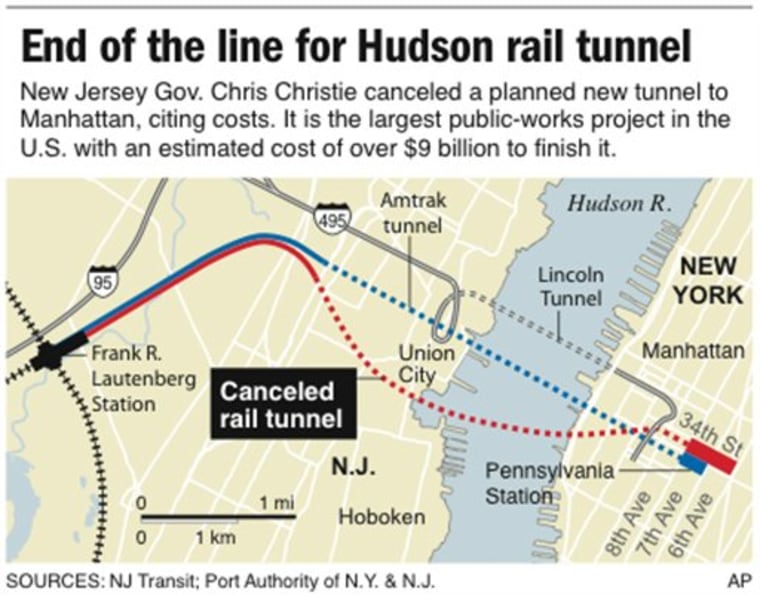Gov. Chris Christie cited New Jersey's lack of money Wednesday in standing by his decision to kill a train tunnel connecting his state to New York City, a move that will force the state to repay $350 million it was given to start the nation's biggest public works project.
Christie, a rising star in the Republican Party for his fearless budget-slashing, has argued that his cash-strapped state can't afford to pay for any overruns on the $9 billion-plus rail tunnel under the Hudson River. The state is on the hook for $2.7 billion plus overruns.
"In the end, my decision does not change," Christie said. "I cannot place upon the citizens of New Jersey an open-ended letter of credit, and that's what this project represents."
The federal government and the Port Authority of New York and New Jersey were each set to contribute $3 billion.
Now, New Jersey must repay the federal government the $350 million it fronted to the state to get the project started. It's also likely New York City will make a bid for the $3 billion in committed Port Authority funds to help complete the city's Second Avenue subway and rail access to Grand Central Station from Long Island.
Transportation Secretary Ray LaHood declined to comment Wednesday on Christie's announcement.
The governor said he was given four financial options for salvaging the project, but he said no agreement could guarantee that New Jersey taxpayers would not pay more than $2.7 billion for the completed project.
One of the options included the federal government, the Port Authority and New Jersey each kicking in an additional $358 million to cover cost overruns.
Another plan would have allowed New Jersey to take out federal loans through the Railroad Rehabilitation and Improvement Financing program, but Christie said he refused to borrow money to cover the project.
Christie also squelched the idea of scaling back the project, saying that would make it less useful to commuters, and he shot down the use of public-private partnerships, which other cities have used for large infrastructure projects.
In a memo to Christie, New Jersey Transit Director James Weinstein said that such partnerships could be used "to address cost and technical risk" of the project, but that developing such a partnership could take at least 18 months. Even then, Weinstein said, there is no assurance that New Jersey would like the price or terms of such a deal.
Construction began last year on the tunnel, which has been in the works for 20 years. In September, Christie suspended work on the tunnel and ordered a cost review. He pulled the plug on the project two weeks ago but gave himself time to reconsider at the behest of federal Transportation Secretary Ray LaHood.
The tunnel is intended to supplement a century-old two-track tunnel that has been at capacity for years, NJ Transit officials have said. It would double the capacity for NJ Transit commuter trains and Amtrak trains between Pennsylvania Station in New York and the city's populous New Jersey suburbs, part of a region that has some of the nation's longest commutes.
More than 625,000 people trek into Manhattan from New Jersey each work day, about 185,000 by rail, and even a minor derailment or delay translates into long stretches of waiting for trains to get to and from work.
On Monday, an eight-car train derailed outside Pennsylvania Station, snarling the evening commute for tens of thousands. No one was injured, but nine of the station's 21 tracks were affected, Amtrak spokesman Clifford Cole said.
Federal Transit Administration chief Peter Rogoff has said that the tunnel will shorten rail trips in the region and reduce the need to transfer between trains, which he said can save several minutes.
Officials estimated it would provide 6,000 construction jobs immediately and as many as 40,000 jobs after its completion in 2018.
"When you do the math, the benefits of this project far outweigh even the highest cost overrun predictions," said New Jersey State AFL-CIO president Charles Wowkanech, who represents 1 million union members.
A report released this month by the Treasury Department and the Council of Economic Advisers estimated that 21 percent of the 8 million jobs lost from December 2007 to December 2009 were in the construction industry.
The report noted a silver lining: An excess supply of workers has driven down construction costs and lowered bids for major infrastructure projects.
"There is also accumulating evidence that construction costs are currently low because of underutilized resources, so it would be especially cost-effective to seize the opportunity to build many of the quality infrastructure projects that are ready to be built," the report concluded.
Some proponents of the tunnel believe Christie is motivated, in part, by wanting to divert the money to state projects. He has refused to raise the gas tax, among the lowest in the nation at 10.5 cents per gallon, to beef up the nearly broke state fund. At least $1.25 billion becomes available for state projects with the tunnel's demise.
The governor has said the tunnel and state transportation needs are separate issues.
"The governor can open any high school history text to see why his decision to kill the tunnel is so foolish," said state Senate President Stephen M. Sweeney. "Imagine where our country would be if it were not for the backbone built by 200 years of investments in roads, canals, railroads or the interstates."
___
Associated Press writers David Porter in Newark and Joan Lowy in Washington contributed to this report.
